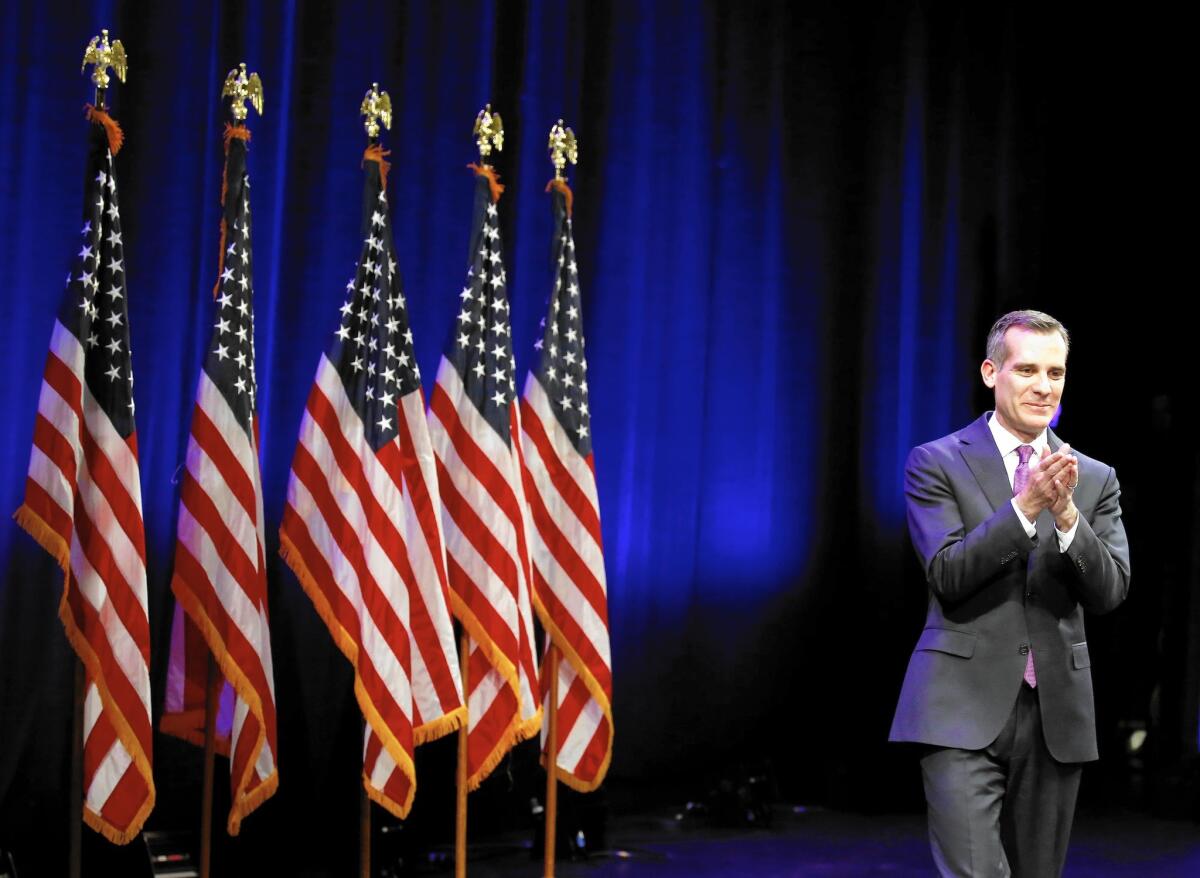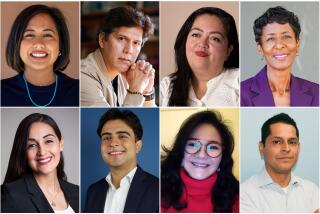At L.A. City Hall, it’s the visionary vs. the lawmakers

When Mayor Eric Garcetti unveiled his plans for Los Angeles in his State of the City address this spring, he welcomed technologies that have transformed the way many people get around town or snag a room for the night.
He declared that companies such as Uber and Lyft, which let customers hail rides through a smartphone app, would be able to pick up passengers at the airport just like taxis. And he said the city would soon forge a deal with Airbnb to collect tourist taxes from those who book rooms or whole homes through its online platform.
But members of the City Council have recently pushed back on both plans, differing with Garcetti about how readily to embrace what is frequently dubbed “the sharing economy.”
Both sides say they expect to reach an agreement on how the city should respond to such technologies. But City Hall observers say there is a subtle push and pull between the mayor and city lawmakers over the new apps — the product of feuding political forces, differing attitudes about tech and the distinct roles that the mayor and council members play in local politics.
Although Garcetti is a tech champion charged with advancing a modern vision for the city, council members have more pressure to be mindful of a wide array of local dissenters, including the taxi industry, hotel workers and housing activists.
Council members voted overwhelmingly two weeks ago to pause plans to let Uber and Lyft pick up passengers at Los Angeles International Airport, raising concerns about whether the companies were properly screening drivers and treating customers equally.
And just days earlier, a panel of council members decided to hold off on negotiating a tax agreement with Airbnb, saying the city first needed to grapple with how it would regulate the online platform that connects travelers with hosts.
At that meeting, Councilman Paul Koretz said when Garcetti budgeted for getting $5 million for affordable housing from an expected deal to reap Airbnb taxes, “the purpose … was to drive us toward accepting Airbnb as it is.”
But the councilman said he never banked on that money, “because I certainly question the way we operate with Airbnb and, in general, the whole sharing — cheating — economy.”
Analysts say the twists in the debate aren’t surprising. In L.A. and across the country, the wave of new apps has raised regulatory questions that can jumble familiar political alliances and create unexpected divisions. “It reflects part of the breakdown of our old economic models … and a confusion that is completely understandable about how the ‘gig economy’ [of freelance service providers] is going to work,” said Harold Meyerson, editor at large of the American Prospect.
Koretz and other lawmakers say they want to carefully regulate such new technologies, not try to wipe them out. For instance, when council members voted to override the airport commission’s decision to allow Uber and Lyft pickup at LAX, they said they weren’t trying to squelch the idea, but to spur more discussion. Some of the lawmakers who voted to reexamine the airport plan are tech enthusiasts: Councilman Bob Blumenfield said he was a fan of “disruptive technology” and an Uber and Lyft user.
“It’s not against the mayor’s agenda in any way,” Councilman Paul Krekorian added. “It’s simply a matter for the council to have an opportunity to make its inquiries.” Airport commissioners ignored a letter he and Koretz wrote asking about insurance policies for Uber and Lyft and other issues, he complained.
Garcetti, in turn, says he also wants regulations and doesn’t want to give such companies “a blank check.” Still, lawmakers appear to be more cautious than the mayor — partly as a result of the different roles they play, analysts say.
“We’re talking about the difference between the person who can be the visionary — and the people who can implement that vision,” said April Rinne, an independent advisor who works with governments and companies on “sharing economy” issues globally.
For the mayor, who has courted tech companies such as Riot Games, championed using technology to smooth the workings of government and even garnered media attention for his Instagram account, the rise of Uber and Airbnb are the future. He has repeatedly argued that it is senseless to try to halt technological change that has created more choices for Los Angeles consumers.
“They’ll vote with their feet and their fingertips and their dollars,” Garcetti said Friday. “And as mayor, I’m there to protect them — and to make sure government isn’t in the way of convenience, and isn’t missing when they need regulatory help.”
For Garcetti, “the politics of this is pretty clear. People like this,” said former county Supervisor Zev Yaroslavsky, now an adjunct professor of history and public policy at UCLA. “And you don’t get in the way of something people like.”
As if to underscore that point, Airbnb recently released a survey that showed 3 out of 4 voters in L.A. were in support of allowing its rentals.
Garcetti also has political connections to the sharing economy: One member of his transition team, Joshua Perttula, now heads a lobbying firm that counts Lyft as a client, and his legal counsel, Rich Llewellyn, is married to an attorney whose firm represents the same company. (Garcetti spokeswoman Connie Llanos said Llewellyn recuses himself from decisions involving ride-sharing.) And City Hall watchers say the man the Huffington Post once dubbed the “hipster mayor” is more attuned to the sharing economy than some on the council.
“His inner circle is all young technology adopters,” said Lisa Gritzner, a lobbyist representing Uber and HomeAway, another vacation rental website.
But the disruptive technologies have also stirred up opposition among powerful political players at City Hall — the taxi industry competing against Uber and Lyft, and the hotel workers union worried by the rise of unregulated alternatives to the big hotels that employ them.
Taxi representatives have pushed for Uber and Lyft to face stricter insurance requirements and include fingerprinting as part of their driver background checks, warning that the burgeoning ride-hailing industry does not have to follow the same rules as cabbies. Meanwhile, housing and labor activists have protested that some Airbnb hosts are exploiting the platform to operate entire homes or apartment buildings like hotels, taking needed housing units off the market.
Yaroslavsky argued that such forces tend to be more politically important for council members than for the mayor, who can afford to tangle with a few groups because he has a wider range of political backers. Though Uber, Lyft and Airbnb have hired lobbyists to press their points at City Hall, they are newer players with weaker ties to longtime council members, said Fernando Guerra, who heads the Center for the Study of Los Angeles at Loyola Marymount University and is a registered city lobbyist.
City lawmakers also tend to be more heavily influenced by neighborhood groups, some of which have complained about nuisances generated when homes are rented out frequently via Airbnb and similar websites. Council members “are the ones on the front lines, getting pushback on a day-to-day level,” Rinne said.
For a mayor, however, “their success usually comes in the form of being somewhat visionary and forward-looking,” said Raphael Sonenshein, executive director of the Pat Brown Institute for Public Affairs at Cal State Los Angeles. “And this is now becoming the litmus test, nationally, for whether you are forward-looking.”
“But just because it’s forward-looking doesn’t mean it’s always right,” he added.
Follow @LATimesEmily for breaking news from Los Angeles City Hall.
Times staff writer Laura J. Nelson contributed to this report.
ALSO:
Lawmakers vote to raise cost of filing proposed ballot initiative from $200 to $2,000
For decades-old homeless camp, the end is near
A minimum wage arms race has broken out in the Bay Area
More to Read
Sign up for Essential California
The most important California stories and recommendations in your inbox every morning.
You may occasionally receive promotional content from the Los Angeles Times.











